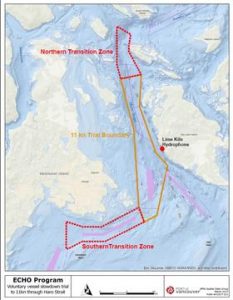Ships to slow near Vancouver Island to reduce noise impacts in key orca feeding area
Shipping Add commentsAbout 14 times a day, a large ship passes through Haro Strait on its way to or from the Port of Vancouver. From early August through early October, Port authorities are asking them to slow down, in a pilot project to assess how that might reduce the overall sound levels of shipping in this biologically important area. “I’d say it’s a first in the world, a project of this scale,” Orla Robinson, manager of the port’s Enhancing Cetacean Habitat and Observation (ECHO) program, said. “We’re trying to understand the relationship between slower vessel speeds, underwater noise levels and the effects on the whales.” In other locales, including San Francisco, ships are asked to reduce their speeds to reduce the chance of striking whales.
 Haro Strait is a narrow passageway between Canada’s Vancouver Island the American San Juan Island, and is a prime summer feeding ground for the resident orca population, which has dwindled to less than 80 members. The voluntary speed restrictions will ask all ships to slow to 11 knots (about 13 mph) through a 16-mile corridor; cruise ships and container ships often run at 18-20 knots, while bulk carriers travel at 13-15 knots. The slowdown will reduce the noise of each ship as it passes by 40% or more, though it will linger in the area a bit longer; the net effect is expected to be beneficial by reducing the degree of impact on animals in the region.
Haro Strait is a narrow passageway between Canada’s Vancouver Island the American San Juan Island, and is a prime summer feeding ground for the resident orca population, which has dwindled to less than 80 members. The voluntary speed restrictions will ask all ships to slow to 11 knots (about 13 mph) through a 16-mile corridor; cruise ships and container ships often run at 18-20 knots, while bulk carriers travel at 13-15 knots. The slowdown will reduce the noise of each ship as it passes by 40% or more, though it will linger in the area a bit longer; the net effect is expected to be beneficial by reducing the degree of impact on animals in the region.
“Underwater noise is one of the principal threats to southern-resident killer whales,” confirmed Lance Barrett-Lennard, head of the Vancouver Aquarium’s cetacean research program. “The effect is thought to be most significant in years when chinook returns are poor, as predicted for 2017.” Marine researcher Rob Williams, co-founder of Oceans Initiative, added: “I’m extremely supportive of this effort. Slowing down is an inexpensive way to reduce noise levels quickly.”
Researchers will monitor noise levels and track how many ships heed the voluntary limit. They will also look at operational and financial impacts on the shipping industry, recognizing that there will be times when docking schedules or tide patterns may make it difficult for ships to slow down. If 50-70% of the ships moderate their speed, the project will be considered a success and will provide good data from which to consider further action in future years.
“If you’d asked me a year ago, there would have been some skepticism,” said Robert Lewis-Manning, president of the B.C. Chamber of Shipping. “As shipping companies have learned more about the ecological challenges, the more they have pitched in to participate. We’e seeing healthy support now. People are supportive of getting the data.” More than 30 companies so far have agreed to participate in the pilot program “where operationally and economically feasible, on a transit-by-transit basis,” including Holland America, Washington State Ferries, Westwood Shipping Lines, COSCO, and container shipping giant Maersk.
UPDATE, 8/7/17: As of today’s start of the research program, 54 companies have agreed to participate in the voluntary slow-down, including 100% of the members of three key trade associations, Chamber of Shipping, Cruise Line International Association Northwest and Canada and Shipping Federation of Canada. It appears that the vast majority of the expected 800 ship transits occurring during the study period will be adopting the slower speeds.
Listen live to a hydrophone at Lime Kiln (red dot in map above).
